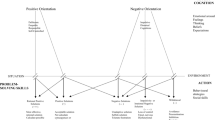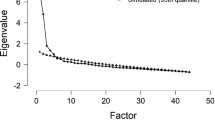Abstract
Forty-four (17 male, 27 female) public school youngsters aged 9–11 years participated in a 12 week group treatment to enhance and improve social skills. The effectiveness of two treatments were compared: problem-solving and problem-solving plus Rational Emotive Behavior Therapy (REBT; Ellis, 1994). Pretest–posttest data were evaluated using the Social Skills Rating System (SSRS; Gresham & Elliott, 1990), and the Child-Adolescent Survey of Irrational Beliefs (CASI; Bernard, Unpublished Manuscript), a measure of four classes of irrational beliefs that are therapeutic targets of REBT. Treatment integrity was assessed by rating segments of audiotaped sessions with the Vanderbilt Psychotherapy Process Scale-Revised (Strupp, 1993, Unpublished Manuscript). Data indicate that the effect sizes for social skills and the components of the CASI were larger for the group receiving the combined treatment.
Similar content being viewed by others
REFERENCES
Bernard, M. The Child-Adolescent Survey of Irrationality. Unpublished manuscript.
Campbell, D. T., & Stanley, J. C. (1966). Experimental and quasi-experimental designs for research. Chicago, IL: Rand Mc-Nally.
Cormier, W. & Cormier, S. L.. (1991). Interview skills for helpers: A cognitive-behavioral perspective. (3rd. ed.). Pacific Grove, CA: Brooks/Cole.
Cohen, J. (1990). Things I have learned (so far). American Psychologist, 45, 1304-1312.
Di Giuseppe, R. (1989). Cognitive therapy with children. In A. Freeman, K. Simon, L. Beutler, & H. Arkowitz (Eds.) Comprehensive handbook of cognitive therapy. NY: Plenum.
Di Giuseppe, R., Linscott, J., & Jilton, R. (1996). Developing the therapeutic alliance in child and adolescent psychotherapy. Applied and Preventive Psychology, 5, 85-100.
Ellis, A. (1994). Reason and emotion in psychotherapy. New York: Harper & Row.
Ellis, A. (1996). Better, deeper and more enduring brief therapy: The Rational Emotive Behavior Therapy Approach. New York: Brunner-Mazel.
Gresham, F. M. (1985). Utility of cognitive-behavioral procedures for social skills training with children: A critical review. Journal of Abnormal Child Psychology, 13, 411-423.
Gresham, F. M. & Elliott, S. N. (1984). Assessment and classification of children's social skills: a review of methods and issues. School Psychology Review, 13, 292-301.
Gresham, F. M. & Elliott, S. (1990). The Social Skills Rating System. Circle Pines, MN: American Guidance Service.
Kazdin, A. E., Ross, D., Ayers, W. A., & Rodgers, A. (1990). Empirical and clinical focus on child and adolescent psychotherapy research. Journal of Consulting and Clinical Psychology, 58, 729-740.
Mersch, P. P., Emmelkamp, P. M., Bogels, S. M., & Van der Sleen, J. (1989). Social phobia: Individual response patterns and long term effects of behavioral and cognitive behavioral interventions. Behavior Research and Therapy, 27, 421-434.
Mersch, P. P., Emmelkamp, P. M., & Lips, C. (1991). Social phobia: Individual response patterns and long term effects of behavioral and cognitive behavioral interventions. Behavior Research and Therapy, 29, 357-362.
Rose, S. D., & Le Croy, C. W. (1985). Improving children's social competence: A multimodal behavioral group approach. In D. Upper & S. M. Ross, (Eds.). Handbook of behavioral group therapy, (pp 173-202). New York: Plenum.
Schmidt, F. L. (1996). Statistical significance testing and cumulative knowledge in psychology: Implications for training of researchers. Psychological Methods, 1, 115-129.
Seligman, M. (1996, May) Presidential elections: Presidential [candidate] statement, The APA Monitor, 10-12.
Spivak, G. & Shure, M. B. (1982). The cognition of social adjustment: Interpersonal cognitive problem-solving thinking. In B. B. Lahey & A. E. Kazdin, (Eds.). Advances in Clinical Child Psychology (Vol.5., pp 323-372). New York: Plenum.
Strupp, H. (1993). Vanderbilt Psychotherapy Rating Scale-Revised Unpublished Manuscript.
Author information
Authors and Affiliations
Rights and permissions
About this article
Cite this article
Flanagan, R., Povall, L., Dellino, M. et al. A Comparison of Problem Solving With and Without Rational Emotive Behavior Therapy to Improve Children's Social Skills. Journal of Rational-Emotive & Cognitive-Behavior Therapy 16, 125–134 (1998). https://doi.org/10.1023/A:1024986327879
Issue Date:
DOI: https://doi.org/10.1023/A:1024986327879




